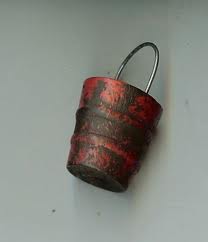 She left her bucket behind
She left her bucket behind The third Sunday of Lent brings us the wondrous fourth chapter of St. John, the so-called “woman at the well.” It is a love story, a story where false, empty, bitterly-failed love meets true, deep, and joyously perfect love. The story has a happy ending, and it is the story of humanity.
A Well
1600 years ago St. Augustine began his homily on this Gospel with these words: “A woman came. She is a symbol of the Church not yet made righteous but about to be made righteous. Righteousness follows from the conversation.” Jesus draws a sinful person into a friendly conversation by sitting down at Jacob’s well in the heat of the day. In the Old Testament, men found their spouses at wells—Moses meets Zipporah, Isaac meets Rebecca, and Jacob meets the beautiful Rachel at watering holes. And so, again at Jacob’s well, a woman comes up, alone, and Jesus is thirsty. Mother Teresa described the thirst of Jesus: “I Thirst is something much deeper than Jesus just saying ‘I love you.’ Even more—he longs for you. He misses you when you don’t come close.” The Samaritan woman approaches, and Jesus draws her close to him. How does He do it?
Give and Receive
He begins with a simple, direct request. “Give me a drink.” I am the needy one, he says to the woman. I need something you can give. The woman is irritated—all she wants is to get her water and be off. “How can you, a Jew, ask me, a Samaritan woman, for a drink?” Jesus responds in a kindly tone (we see how she begins to soften) and offers her his own gift of “living water.” She is beginning to be touched that this Jew would accept anything from a dirty Samaritan, and want to give something in return. “Sir, give me this water,” she says. She begins to thirst for him.
Uncovering her Sin
And now Jesus is in a position to gently uncover the bleeding wound of her sin. He has come to address the real problem—her failed attempts at love. She has had five husbands, and is sleeping with a sixth. What was she looking for in those six men? At Jesus’ gentle but playful prompting, she admits this bravely, as if making a good confession after 20 years. She says “I can see you are a prophet” and goes to the question of faith: on what mountain should we worship? How can I truly love God? “I know that Messiah is coming, and he will tell us everything.”
And Jesus simply says, I am He. I am the God, I am the Man, I am the love you have been looking for. Notice this detail: she drops her bucket by the well and runs back to town. She no longer needs that dirty little bucket; she no longer needs fetid water from stagnant wells. And in her joy, she runs back to town to share her joy—the “joy of the Gospel”—with her townsfolk.
I Thirst
The woman at the well tells us two things about ourselves. First, that we all have dirty little wells into which we dip, hoping for some kind of satisfaction. What is your watering hole? Is it a bar or a dirty little pit where you drink alcohol? Is it pornography, America’s dirty little secret? Pornography and fornication are the mockery of love, as the Samaritan woman learned from bitter experience. She urges you to abandon that well. Throw your cracked, dirty little bucket down and run back to town, engage the culture in witness that Jesus Christ is the only love that satisfies the thirsting human heart.
And second, the Samaritan woman tells us that Jesus is the first to ask: “Give me a drink.” We say, but God, what can I give to you? And Jesus, the beggar by that well, the poor one hanging from the cross, replies: “You can give me your heart.” I am dying of thirst for your heart. Once we have given that, we are capable of receiving his infinite gift. God wants to espouse us to Himself. He sits by our dirty little wells—our addictions, our sins—and looks up at us. “I’m thirsty. Please give me a drink.”
“Jesus thirsts for you … always, even when you don’t feel worthy,” wrote Mother Teresa. “Until you know deep inside that Jesus thirsts for you—you can’t begin to know who He wants to be for you. Or who He wants you to be for Him.” Our Lady first heard those words from the Cross—I thirst. She knows. She knows who Jesus wants to be for you, and who He wants you to be for Him. Go with her to the Cross, and give our crucified Lord something to drink, from you own heart.


 RSS Feed
RSS Feed